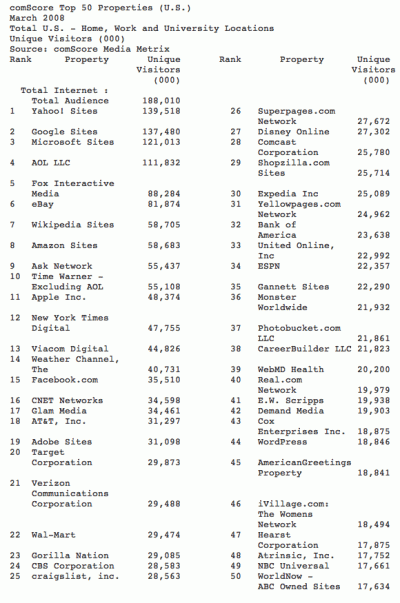Over the last month, the internet has been awash with stories of the fabled New York Times slow demise, as indicated by huge losses and impending layoffs. As the new Wall Street Journal hires, the New York Times fires.
The decline in New York Times revenue and readership surprised me somewhat, but I accepted the decline at face value. Given the New York Times atrocious editorial standards throughout the Bush regime, including aiming and abetting war crimes (Judith Miller), the loss in circulation seemed like just desserts.
But today, Comcast’s list of the top 50 websites for March came across my desk. Based on unique visitors, guess who’s at number 12 with 47 million unique visitors for the month? For refernce, that’s just behind Wikipedia, Amazon and ahead of Facebook, CNET, Adobe, CBS and Craigslist: The New York Times Digital.

Comcast top 50 websites by unique visitors
Which set me to thinking what kind of second rate media (advertising sales) strategy would it take to lose money with the number 12 website.
I don’t know how reliable the Comcast numbers are so I went and ran some quick checks on Alexa.com.
While the numbers are not as good over at Alexa (the New York Times is number 25 in the United States), the reach is still fabulous. Where the New York Times falls down is in page views. They average only 3 page views per unique visitor.
Contrast those page views with Wikipedia at 5 page views per unique visitor or Google at 7 page views per unique visitor or Facebook with 25 page views per visitor.

nytimes vs wikipedia vs amazon vs digg vs facebook
Why are the page views so low for what should be a multiple page view experience (who opens a newspaper to read one article)?
The silly registration hoops. You can’t read NYTimes.com without jumping through hoops. Either you register with them (and they kill off the registrations occasionally, requiring reregistration as I did register once but my login is dead) – or you can’t view the site. They’ve taken to effectively blocking BugMeNot.com which used to be the best way to log in to NYtimes.com in a hurry.

NYtimes registration firewall lockout
It is possible to bypass the login with a very clever automated NYTimes registration bot which generates a totally anonymous profile in a nanosecond. You can link to stories with a special URL which can be generated with a javascript bookmark.
All of these shenanigans are time consuming and annoying. And guess the results – you arrive at NYtimes.com from a weblog on a permalink. You seem something else interesting and want to go and have a look. Paff – you’re locked out. Register or forget it (correction: apparently you do get four or five peeks before you hit the registration firewall).
Once you do register, a good number of the stories still won’t be accessible without paying a ludicrous fee ($5 for a newspaper article?).
So now the business model is to start letting journalist go. So less high quality (I think they got rid of Judith Miller, no? and lately they’ve been letting a lot of Republican cats out of a deep dark bag – so let’s be optimistic) original content. Less information for the search engines, less possibility of generating original content.
I don’t understand these guys. Their assets are:
- brand
- original content
What they think are is their third asset – traffic/eyeballs – is only built on the first two. So when they dump a certain amount of the original content, down goes the traffic. The only thing differentiating the NYtimes from all kinds of news and aggregators is their pressroom.
The first attack came on the quality – the brand:
Well, they didn’t let Judith Miller go. And her fact-impaired cheerleading for the Iraq war has helped land us in a mess that’s going to last at least another 10 years, in my opinion. And kill several thousand more US soldiers, several *hundred thousand* more Iraqi civilians, cost us trillions more dollars, and worse…
The problem the Times has isn’t the quantity of reporters, it’s the quality. People know they can’t rely on truth from the times on important issues, because they *have not* been able to rely on,
Wave two is coming on quantity (number of reporters).
With the traffic, search engine rankings and original content they have, someone in the NYtimes media department is doing a seriously bad job of promoting and monetizing the site.
Years ago Salon.com came up with the model of subscriptions or day passes which require viewing advertising. It’s still working for them (and they are looking for New York advertising reps). In the meantime, couldn’t somebody clever implement this or come up with something new?
If the New York Times media department doesn’t hurry up and figure out how to extract revenue from their brand and original content, the next loss will be traffic. From the loss of traffic, there will be no return.
This is not a critique of their tech department who seem to know what they are doing:
- high search engine rankings
- good internal search
- attractive layout
- open source contributions
But rather a critique of the business side of operations.

Alec Kinnear
Alec has been helping businesses succeed online since 2000. Alec is an SEM expert with a background in advertising, as a former Head of Television for Grey Moscow and Senior Television Producer for Bates, Saatchi and Saatchi Russia.


I have given the NY Times a great story about Verizon and they refuse to publish it. I have to assume that because Doreen Toben, the CFO for Verizon is on the Board of the NY Times, this the reason why. Catherine Mathis of the NY Times has refused to have the story published. Is this how they handle other stories ?
Hello Brenda,
Based on NY Times performance during the Bush years, I think it is.
The sinking circulation and their red financial ink seems to have woken them out of their torpor. The article about the Pentagon propaganda talking heads was something of a scoop, very long and certainly undesired by the Bush administration.
But we haven’t seen much of that investigative reporting in the last five years. If we had, their circulation and reputation would be in better condition.
I’m always keen to know what Verizon is up to. Could you share some of the story with us?
Hi Alex, I will be glad to share this. Verizon is under investigation by the IRS for tax evasion and tax fraud. Verizon has avoided paying taxes by firing and forcing to retire sick and disabled employees, then denying disability retirements and associated benefits. All corporate officers, including Doreen Toben, the CFO of Verizon that is on the board of directors for the NY Times has been part of this for years. I was the one that made the complaint to the IRS. less than an hour after asking the question of the IRS if the story and circumstances I provided was considered tax fraud and evasion, I got a response from them with the forms to file the information and complaint. I have heard from the IRS several times now and added more details as they require. It is my opinion that there is a conflict with the NY Times because of Doreen Toben and that is apparently why they are refusing to publish the story. I gave them a copy of the emails with the IRS , a copy of the complaint and other details. I can only assume that my concerns are correct.
Hello Brenda,
It’s difficult to get the NY Times or ABC News to bite on a story.
What they like to do is poach their news from other news organisations. If you had a good local article published on the topic, the NY Times might see that and do a piece of their own exploring the issue further.
News is highly cannibalistic, especially American news. I recommend you contact your local paper and give them the full scoop. The journalists there will be hungrier for some original news. If the story is good, other news organisations will follow.
To address the substance of your story, the behaviour of corporate America is truly horrifying and seems to be getting worse. With the Bush government and GOP judiciary smiling on such ruthlessness, it’s very difficult to fight back.
Keep up the good fight and bring your story to light.
I dont care if somebody asks for registration, beacuse I use false name.
While there have been some decreases in newspaper circulation not all of it can be called failure or a complete shift away from this traditional medium. In many cases the decreases are genuinely business oriented—things like voluntary circulation cutting to outlying areas because of escalating fuel costs. Diego Vasquez wrote an article about circulation based on a Q&A with Rick Edmonds, media business analyst for the Poynter Institute.
There seems to be a lot more to the picture than it seems. The one thing that’s certain is that the only real way to tell what’s going on is through the use of audited circulation statements. Furthermore, though there may be a shift to online media that only reinforces the need for the development of realistic audit processes for that medium. We’ve been working with a group called Buy Safe Media and they’ve got some good info on the value of audited media.
Hello Amanda,
Thanks for the link to the Rick Edmonds Q & A and that hilarious cartoon. Normally I loathe flash, but Buy Safe is using the bandwidth well.
My issue is not the circulation numbers but the mismanagement of the online potential at the NY Times. There’s no way they should be struggling right now – they had great content and traffic and should be able to turn that into hiring instead of firing.
Partly it’s bad commercial decisions, but it’s partly bad editorial decisions. I don’t trust the NY Times anymore. They have so often been mouthpieces for propaganda from the Bush administration, various neocons and/or the Pentagon that I prefer to seek my own information from critical weblogs. When there is a really good article in the NY Times someone will link to it. But I won’t read it as the paper of record anymore. There are lots of others making similar complaints.
Credibility and opportunity have been squandered at the NY Times over the last seven years. They shouldn’t be in this position. But they earned it.
They could fix the commercial end, relatively easily. And the story about the Pentagon propaganda indicates there is some hope for the editorial end as well.
The NT Times is a liberal trash paper. That’s why it’s failing. There’s nothing really news worthy printed in it – just fluff. Who, except libs want to read that?
The times is also getting slaughtered by online news sources -just like everyone else. Furthermore – most news agencies don’t even produce their own news any more – they just reprint AP articles. So what’s the point of having all these news media outlets, when they are all just reprinting that same crap from AP?
There is still a place for news – but it has to be well thought out, researched, verified and reliable. The Times doesn’t do that – the Wall Street Journal does. That’s why the WSJ continues to survive, and the Times (along with many other crummy “news” organizations) are dying off like the dinosaurs that they are.
Hello Slick,
We agree about reprinting AP, but I’d hardly call the NY Times liberal at this point.
In what way are you beholden to Robert Murdoch?
I’d say the WSJ has taken a sharp turn for the worse since he took over, into doctrinaire laissez-faire economic ranting, along with disingenuous neocon politicking. It used to be that what was written in the WSJ was interesting and influential. At this point, most of it is predictable and trite.
As just one small example, the WSJ is encouraging tax fraud. You can’t get much more bankrupt intellectually or ethically.